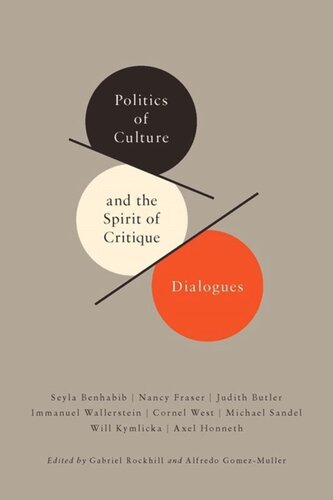

Most ebook files are in PDF format, so you can easily read them using various software such as Foxit Reader or directly on the Google Chrome browser.
Some ebook files are released by publishers in other formats such as .awz, .mobi, .epub, .fb2, etc. You may need to install specific software to read these formats on mobile/PC, such as Calibre.
Please read the tutorial at this link: https://ebookbell.com/faq
We offer FREE conversion to the popular formats you request; however, this may take some time. Therefore, right after payment, please email us, and we will try to provide the service as quickly as possible.
For some exceptional file formats or broken links (if any), please refrain from opening any disputes. Instead, email us first, and we will try to assist within a maximum of 6 hours.
EbookBell Team

0.0
0 reviewsThis book of tightly woven dialogues engages prominent thinkers in a discussion about the role of culture-broadly construed-in contemporary society and politics. Faced with the conceptual inflation of the notion of 'culture,' which now imposes itself as an indispensable issue in contemporary moral and political debates, these dynamic exchanges seek to rethink culture and critique beyond the schematic models that have often predominated, such as the opposition between "mainstream multiculturalism" and the "clash of civilizations."
Prefaced by an introduction relating current cultural debates to the critical theory tradition, this book examines the politics of culture and the spirit of critique from three different vantage points. To begin, Gabriel Rockhill and Alfredo Gomez-Muller provide a stage-setting dialogue, followed by discussions with two major representatives of contemporary critical theory: Seyla Benhabib and Nancy Fraser. Working at the horizons of this tradition, Judith Butler, Immanuel Wallerstein, and Cornel West then provide important critical perspectives on cultural politics. The book's concluding section engages with Michael Sandel and Will Kymlicka, who work out of the Rawlsian tradition yet are uniquely concerned with the issue of culture, broadly understood. The epilogue, an interview with Axel Honneth, returns to the core issue of critical theory in cultural politics. Ranging from recent developments and progressive interventions in critical theory to dialogues that incorporate its insights into larger discussions of social and political philosophy, this book sharpens old critical tools while developing new strategies for rethinking the role of 'culture' in contemporary society.